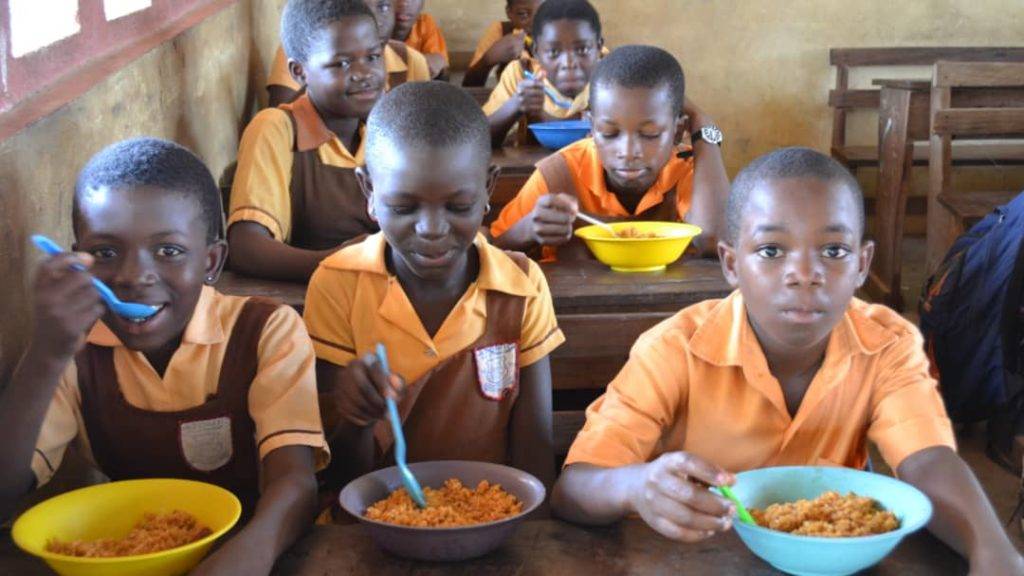President Bola Ahmed Tinubu has taken a decisive step towards addressing the concerning issue of out-of-school children by ordering the reinstatement of the school feeding program. This pivotal decision was revealed by the Minister of Education Prof Tahir Mamman, during a concentrated one-day retreat aimed at formulating prompt solutions within the Ministerial deliverables spanning from 2023 to 2027.
Prof Mamman emphasized that the President’s directive specifically entails the transfer of the school feeding programme from the Ministry of Humanitarian Affairs back to the Ministry of Education. This strategic move reflects a profound commitment to re-establishing the programme’s core focus on education and leveraging it as a means to counter the escalating numbers of out-of-school children across the nation.
This significant policy shift signifies a reevaluation of national priorities, positioning education as a cornerstone for social development and change. The redirection of the school feeding programme aligns with the broader goal of consolidating efforts to combat the persistent challenge of out-of-school children.
Retreat Insights and Implementation Strategies for school feeding program and other policies
The Minister highlighted that the essence of the retreat lay in the exploration of effective methods to actualize numerous policies designed to confront the staggering prevalence of out-of-school children. Central to this discussion was the delegation of responsibilities across various agencies tasked with remedying the pervasive issue.

During the retreat, stakeholders engaged in comprehensive discussions aimed at distilling responsibility among multiple agencies, ensuring a coordinated approach to tackle the out-of-school children problem. The deliberations underscored the imperative nature of collaborative efforts among government bodies, emphasizing a unified strategy to overcome the complex hurdles hindering education accessibility for many children.
Moreover, the retreat served as a platform to assess and reinforce the commitment of governmental agencies in executing these policies efficiently. The overarching goal remains not just the reinstatement of the school feeding programme but also its optimization as a tool for reintegration and retention of children within the educational system.
Implications of school feeding program and Path Forward
President Tinubu’s directive to reintroduce the school feeding program under the Ministry of Education heralds a paradigm shift in addressing the crisis of out-of-school children. By refocusing this initiative within the educational framework, the government aims to create a holistic ecosystem that not only provides meals but also incentivizes and promotes sustained enrollment and participation in schools.

The strategic realignment is poised to instigate a domino effect, potentially reducing the alarming statistics of out-of-school children while bolstering educational infrastructure and inclusivity. However, effective implementation remains crucial. This shift mandates rigorous planning, resource allocation, and meticulous coordination among relevant stakeholders to ensure the programme’s success in achieving its intended objectives.
In essence, the President’s directive signifies a significant leap forward in the government’s commitment to combat the out-of-school children crisis, laying the groundwork for a more inclusive and comprehensive approach to education accessibility and retention nationwide
School Feeding Programs: Key Benefits for Children and Adolescents
According to the minister of education Prof Mamman the School feeding programs play a pivotal role in addressing hunger among children and adolescents, offering a strategic intervention to combat food insecurity. By providing nutritious meals, these programs significantly contribute to reducing micronutrient deficiencies and anemia, ensuring that students receive essential nutrients vital for their growth and development. Through the provision of balanced meals, these initiatives not only satisfy immediate hunger but also combat malnutrition, laying a foundation for healthier lives.
School feeling program will Preventing Overweight, Obesity, and Improving Health
Moreover, these programs serve as a means of preventing overweight and obesity among school-aged children by offering carefully planned, nutritionally balanced meals. By encouraging healthy eating habits from an early age, school feeding initiatives promote wellness and reduce the risk of various health issues associated with poor nutrition. This proactive approach not only enhances physical health but also cultivates a deeper understanding of healthy dietary choices among children and adolescents.

Enhancing Education Access, Performance, and Gender Equity
School feeding programs are instrumental in boosting school enrollment and attendance rates. By alleviating hunger and ensuring adequate nutrition, these initiatives remove a significant barrier that might otherwise hinder children from attending school regularly. Moreover, access to nutritious meals positively correlates with improved cognitive function and academic performance, empowering students to excel in their studies. Additionally, these programs contribute to fostering gender equity in education by ensuring that all students, regardless of gender, have equal access to the benefits of education, thereby fostering a more inclusive learning environment.
The school feeding programs are multifaceted interventions that not only address immediate nutritional needs but also contribute significantly to the holistic development of children and adolescents. Their impact spans from alleviating hunger and improving health to enhancing educational outcomes and promoting gender equality, making them a crucial component in nurturing healthier and more empowered generations.
Table of Contents
Discover more from OGM News NG
Subscribe to get the latest posts sent to your email.














